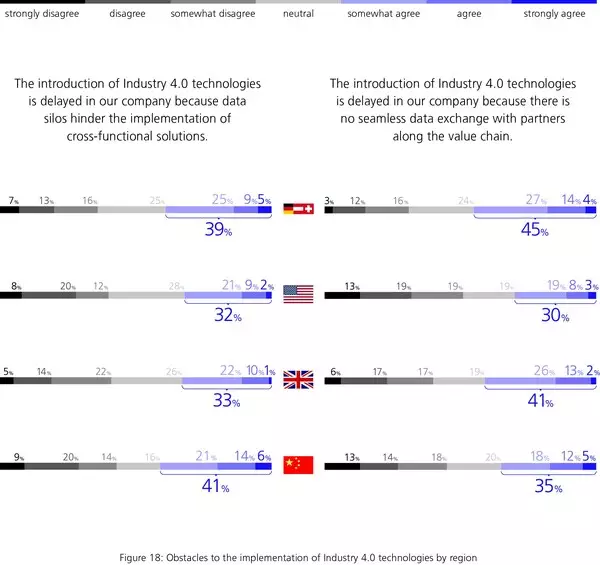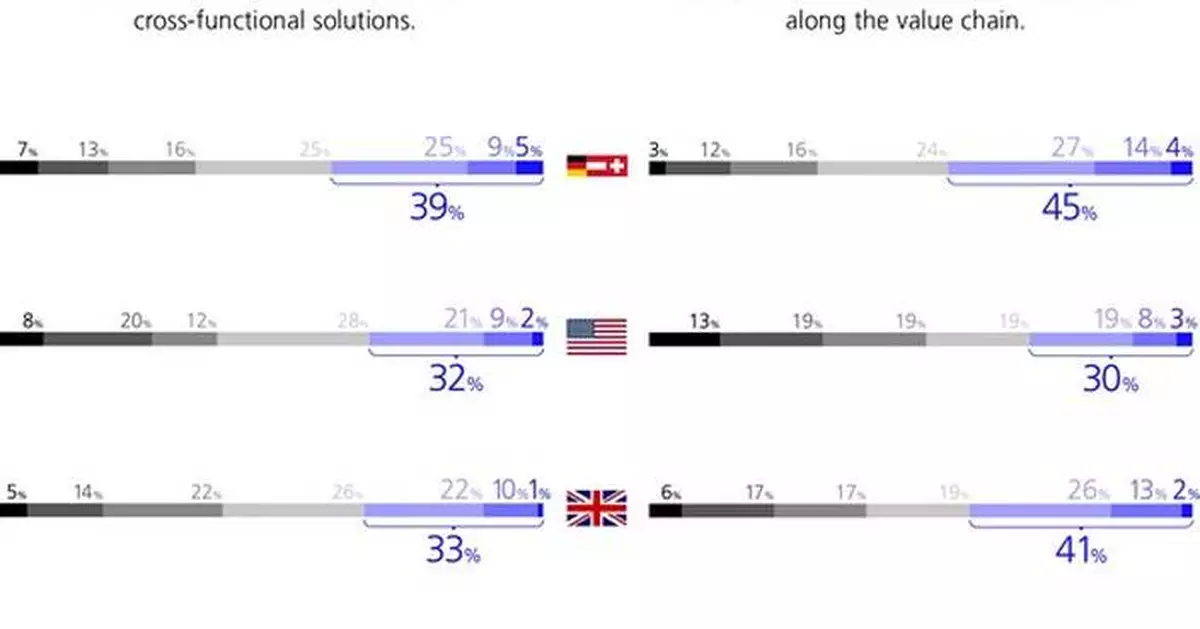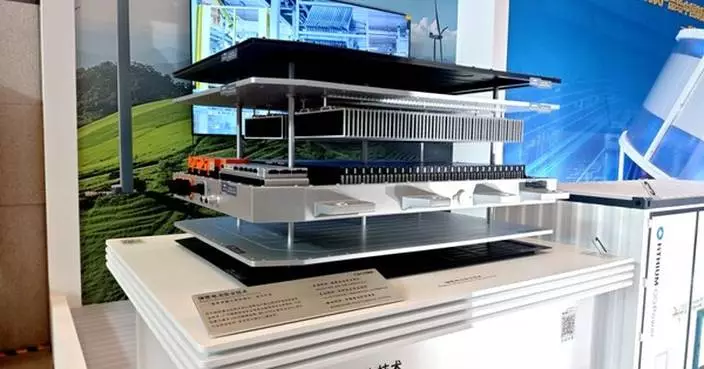 |
Industry 4.0: China and the USA continue to leave Europe behind
LUDWIGSBURG, Germany and MUNICH, March 19, 2025 /PRNewswire/ -- According to the overall assessment of MHP's Industry 4.0 Barometer, the degree of digitalization in industry is increasing worldwide, although no longer as quickly as before. China and the US are further increasing their lead over the DACH region and the UK. These are two key findings of the Industry 4.0 Barometer, which has been published by management and IT consultancy MHP in conjunction with Ludwig-Maximilians University Munich (LMU). Researchers surveyed 823 people from industrial companies in China, in the US, in Germany, Austria, Switzerland, and the UK. The study records the spread and maturity level of Industry 4.0 technologies, makes the status quo comparable between countries, and highlights developmental trends since 2018.
Markus Wambach, Group COO at MHP, said: "We've been publishing the Barometer for seven years. It initially mapped the Germany-wide Industry 4.0 benchmark and has been measuring and comparing the level of maturity internationally since 2021. This is particularly clear when it comes to digital twins: while 30 percent of companies in the DACH region do not use digital mapping and do not plan to, this figure is 18 percent in the US and just 5 percent in China. Some companies are also behind the curve in other areas, such as automation and data analysis."
An example of the technological status can be seen in driverless transport systems (DTS). In the US, 45 percent of industrial companies already use these wholly or partially for intralogistics operations, whereas this figure is 59 percent in China and just 35 percent in the DACH region. The situation is similar when it comes to digital twins: 67 percent of the participating Chinese companies use digital twins in their production facilities, either partially or completely. By contrast, the proportion in the US is 49 percent and, in the German, -speaking countries 41 percent.
Focus topic: data-driven production
Although considerable progress has been made in almost all areas of Industry 4.0, this year's findings show that data analysis capabilities are improving more slowly in comparison. This year's focus topic of data-driven production addresses this fact and asks how companies can make effective use of their data sets along the value chain in order to optimize their production. Internationally, it is clear that the majority of respondents perceive a data-related competitive advantage as a clear benefit.
Although many DACH companies do have data, they are not making adequate use of it to reach data-based decisions or drive forward innovation. Among other things, there is a lack of an integrated data strategy that targets future technologies (AI, digital twins). Chinese and US companies are more advanced here: 91 percent of US companies treat data as a strategic asset, compared with 78 percent in China and 64 percent in the DACH region.
The full study can be downloaded from the MHP Newsroom: https://www.mhp.com/en/insights/newsroom
Industry 4.0: China and the USA continue to leave Europe behind
LUDWIGSBURG, Germany and MUNICH, March 19, 2025 /PRNewswire/ -- According to the overall assessment of MHP's Industry 4.0 Barometer, the degree of digitalization in industry is increasing worldwide, although no longer as quickly as before. China and the US are further increasing their lead over the DACH region and the UK. These are two key findings of the Industry 4.0 Barometer, which has been published by management and IT consultancy MHP in conjunction with Ludwig-Maximilians University Munich (LMU). Researchers surveyed 823 people from industrial companies in China, in the US, in Germany, Austria, Switzerland, and the UK. The study records the spread and maturity level of Industry 4.0 technologies, makes the status quo comparable between countries, and highlights developmental trends since 2018.
Markus Wambach, Group COO at MHP, said: "We've been publishing the Barometer for seven years. It initially mapped the Germany-wide Industry 4.0 benchmark and has been measuring and comparing the level of maturity internationally since 2021. This is particularly clear when it comes to digital twins: while 30 percent of companies in the DACH region do not use digital mapping and do not plan to, this figure is 18 percent in the US and just 5 percent in China. Some companies are also behind the curve in other areas, such as automation and data analysis."
An example of the technological status can be seen in driverless transport systems (DTS). In the US, 45 percent of industrial companies already use these wholly or partially for intralogistics operations, whereas this figure is 59 percent in China and just 35 percent in the DACH region. The situation is similar when it comes to digital twins: 67 percent of the participating Chinese companies use digital twins in their production facilities, either partially or completely. By contrast, the proportion in the US is 49 percent and, in the German, -speaking countries 41 percent.
Focus topic: data-driven production
Although considerable progress has been made in almost all areas of Industry 4.0, this year's findings show that data analysis capabilities are improving more slowly in comparison. This year's focus topic of data-driven production addresses this fact and asks how companies can make effective use of their data sets along the value chain in order to optimize their production. Internationally, it is clear that the majority of respondents perceive a data-related competitive advantage as a clear benefit.
Although many DACH companies do have data, they are not making adequate use of it to reach data-based decisions or drive forward innovation. Among other things, there is a lack of an integrated data strategy that targets future technologies (AI, digital twins). Chinese and US companies are more advanced here: 91 percent of US companies treat data as a strategic asset, compared with 78 percent in China and 64 percent in the DACH region.
The full study can be downloaded from the MHP Newsroom: https://www.mhp.com/en/insights/newsroom
** The press release content is from PR Newswire. Bastille Post is not involved in its creation. **

MHP and LMU Munich publish Industry 4.0 Barometer 2025
T. Rowe Price Investment Management, Inc. and Braidwell LP participate as new investors
Stephen Williams, MD, Ph.D. joins as Chief Scientific Officer
Rebecca Chambers and Frank Witney, Ph.D. appointed to Board of Directors
FREMONT, Calif., Jan. 12, 2026 /PRNewswire/ -- Alamar Biosciences, Inc. ("Alamar"), a leader in precision proteomics dedicated to advancing the early detection of disease, announced the close of an oversubscribed convertible notes financing, bringing in more than $50 million of new capital. Accounts advised by T. Rowe Price Investment Management, Inc. and Braidwell LP joined the financing as new investors. Existing investors, including Illumina Ventures and Sands Capital, also participated. The financing will support the continued commercial advancement of Alamar's precision proteomics platform.
"We deeply appreciate the continued support from our existing investors and are excited to welcome our new partners," said Dr. Yuling Luo, founder, chairman, and chief executive officer of Alamar. "Their confidence in our vision and strategy underscores the transformative potential of our work. This investment will enable us to accelerate innovation and continue to expand the reach of our platform, unlocking the full value of precision medicine and early disease detection."
Leadership and Board Expansion
Alamar also announced key additions to its executive leadership team and board of directors to support the company's continued growth and commitment to operational excellence.
To further strengthen its scientific leadership, Alamar welcomes Dr. Stephen Williams as Chief Scientific Officer. Steve brings more than three decades of experience in precision medicine and biomarker innovation. He most recently served as Chief Medical Officer at Standard BioTools and SomaLogic, and previously spent 18 years at Pfizer in senior leadership roles. A recognized leader in the scientific community, he has served on the NIH National Advisory Council for Biomedical Imaging and Bioengineering, helped launch the Alzheimer's Disease Neuroimaging Initiative, and co-founded the FDA-FNIH-PhRMA Biomarker Consortium.
Alamar has also appointed Rebecca Chambers and Dr. Frank Witney as directors to its board. Rebecca, Chief Financial Officer at Veracyte, brings deep financial and healthcare leadership experience from her current role as well as previous positions at Outset Medical, Illumina, Myriad Genetics and Life Technologies. Frank, an operating partner at Ampersand Capital Partners, adds over three decades of life sciences leadership experience, including serving as President and CEO of Affymetrix and Dionex Corporation, and currently sits on the boards of Revvity, Cerus Corporation, Standard BioTools, and several private companies.
"I am thrilled to welcome Steve to our leadership team, and Rebecca and Frank to our board of directors," said Dr. Yuling Luo. "Their deep expertise and diverse perspectives will be invaluable as we accelerate our mission to unleash the power of our Precision Proteomics platform, to enable broad impacts across health and disease. This is an exciting moment for Alamar, and we look forward to the impact their leadership will have on driving innovation and growth."
About Alamar Biosciences, Inc.
Alamar Biosciences is a privately held life sciences company dedicated to powering precision proteomics to enable the earliest detection of disease. Leveraging its proprietary NULISA™ technology and the ARGO™ HT System, Alamar's platform is designed to deliver ultra-high sensitivity and addresses key limitations of existing technologies to deliver precision proteomics. For more information, please visit alamarbio.com.
** The press release content is from PR Newswire. Bastille Post is not involved in its creation. **

Alamar Biosciences Announces Close of Oversubscribed Convertible Notes Financing and Expansion of Leadership Team

Alamar Biosciences Announces Close of Oversubscribed Convertible Notes Financing and Expansion of Leadership Team

Alamar Biosciences Announces Close of Oversubscribed Convertible Notes Financing and Expansion of Leadership Team

Alamar Biosciences Announces Close of Oversubscribed Convertible Notes Financing and Expansion of Leadership Team















